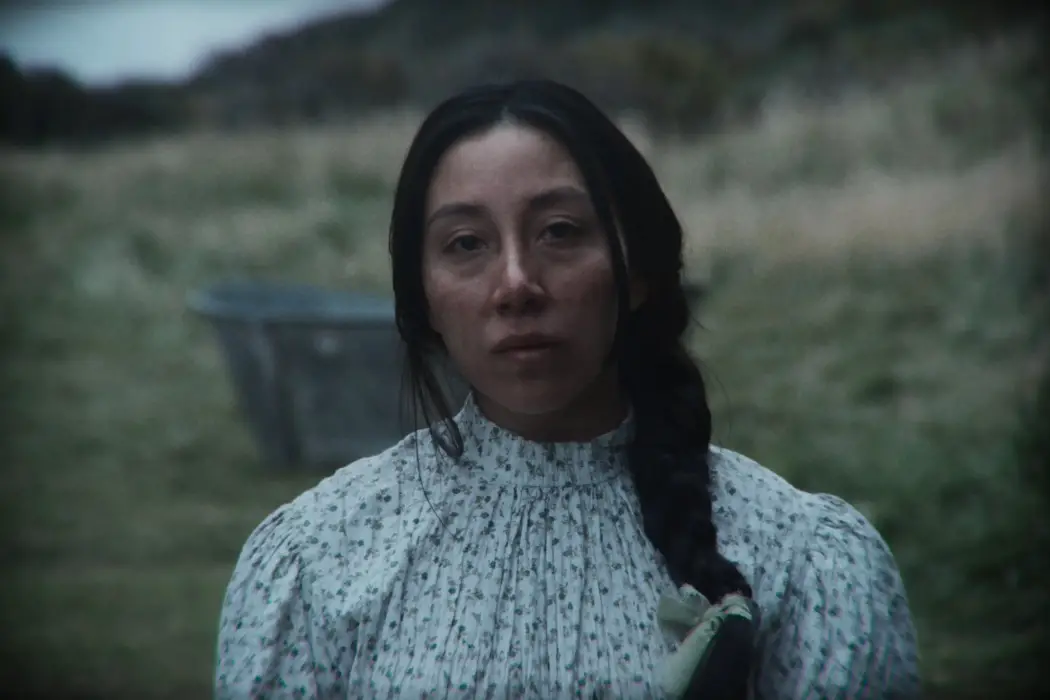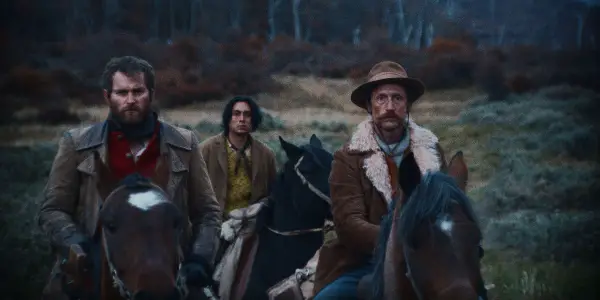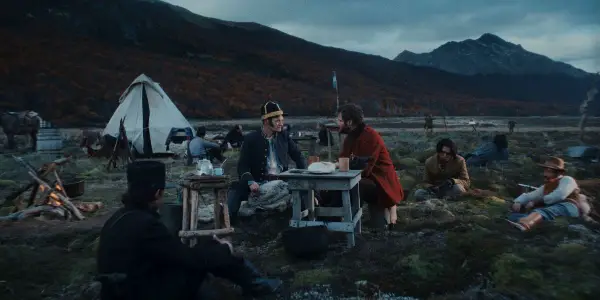New York Film Festival 2023: THE SETTLERS: Witnessing A Nation Built On Genocide

Kevin L. Lee is an Asian-American critic, producer, screenwriter and…
It’s one thing to portray a systemic genocide that most viewers are not as familiar with, but it’s another step entirely to show how such violence is woven into the very fabric of society. That is the case with Felipe Gálvez Haberle’s The Settlers, a film not just about the atrocities committed against the Selk’nam (or Onas) of Chile, but about the absence of reckoning.
Set in 1893, in a vast Chilean landscape that has just been granted to Spanish businessman José Menéndez, the film sees three very different men on a journey to claim – or “clean” – the new land. Brought together not by choice but by Menéndez’s employment, the trio consists of English army captain MacLennan (Mark Stanley), American mercenary Bill (Benjamin Westfall), and Chilean mestizo Segundo (Camilo Arancibia). Frankly, from the opening scene, as we witness the landscape and the harsh working conditions through Segundo’s eyes, we already get a sense that his very existence is on thin ice. If it weren’t for his mixed race and his talent in shooting accuracy, he might have been gone already.
Bleak Atmosphere Amidst a Gorgeous Backdrop
One of the instant greatest achievements behind The Settlers is Haberle’s handling of atmosphere. Amidst some of the most gorgeous nature photography that rivals films like The Revenant, The Power of the Dog, and True Grit, the film relies on a sound-effect-driven percussionist score to keep us constantly on edge. Though the words exchanged among the men come off as administrative and business-oriented, we know just how much of that rhetoric is rooted in violence and evil. Haberle keeps that anticipation of violence brewing at all times.

As they journey to the Andes Mountains and the Argentina-Chile border, we observe and silently judge these characters through Segundo’s eyes, sometimes even through innocent eyes like a horse’s. With such cruelty and hate being openly expressed at all times, whether it’s tension between MacLennan and Bill or animosity from other white colonists, we come to understand that the only way to survive in these lands is to be silent. But silence allows for the atrocity to happen. The film captures these outbursts of violence in a matter-of-fact way, often through undramatic wide shots, in a manner that makes Segundo and the audience powerless. We can’t do anything but watch.
How Does It Build Into the Future?
And then the film does a time jump, a few years into the future where luxurious homes are built, elaborate dresses are being worn, and aspects of “modern society” have been established. Here, we meet a few new characters who, through some expository dialogue exchanges, explain what has happened since we last saw the trio. Though one can criticize these scenes as an oversimplification of things we could’ve seen ourselves, I’d argue it is an effective method to translate the film’s first half in “cinematic depiction” to what is now “history.” We learn that MacLennan has passed away, but the characters speak of his deeds and actions as if he will be remembered as a contributing figure to the founding of the nation.

Who we do get to see again is Segundo, who has proven again that he knows how to survive the worst conditions. Aside from having a wife and his own home, it is clear from his eyes that not much has changed. If anything, it has numbed him, made his heart become more of stone than blood. Even with the arrival of a state official (Marcelo Alonso) investigating the atrocities that Segundo was involved in, we don’t feel an ounce of hope or retribution. What kind of retribution can there be, when the war has already been fought and the damage has been permanently done?
The Settlers: A Riveting Debut
When we get to the final 20 minutes of The Settlers, Haberle hits home on what genocide truly leaves behind in world history – that it is more than just a period of evil and murder, but it shapes the societal entity that is formed afterwards. Much like how America is (and might always will) still reckoning with its foundation built upon a history of racism, Chile is certainly confronting its own colonial history here.
Haberle directs as if he has already directed over ten films. Not many directorial debuts start with this level of confidence and care into the craft and subject matter. Not only are we given a disturbing portrayal of a forgotten chapter in world history, but we are pressed to think on collective guilt and a nation’s legacy of sins. Through its bleak beautiful cinematography and its off-kilter score that never wavers, The Settlers is a riveting piece of work that will be among the year’s best films.
Does content like this matter to you?
Become a Member and support film journalism. Unlock access to all of Film Inquiry`s great articles. Join a community of like-minded readers who are passionate about cinema - get access to our private members Network, give back to independent filmmakers, and more.
Kevin L. Lee is an Asian-American critic, producer, screenwriter and director based in New York City. A champion of the creative process, Kevin has consulted, written, and produced several short films from development to principal photography to festival premiere. He has over 10 years of marketing and writing experience in film criticism and journalism, ranging from blockbusters to foreign indie films, and has developed a reputation of being “an omnivore of cinema.” He recently finished his MFA in film producing at Columbia University and is currently working in film and TV development for production companies.













